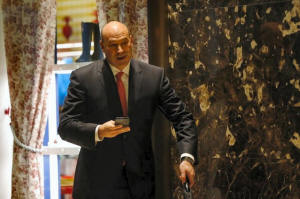|
Trump to name Goldman executive Cohn to
key economic post
 Send a link to a friend
Send a link to a friend
 [December 10, 2016]
By Steve Holland [December 10, 2016]
By Steve Holland
BATON ROUGE, La. (Reuters) - U.S.
President-elect Donald Trump will likely ask a senior Goldman Sachs
banker to coordinate economic policy across his administration, turning
again to Wall Street for expertise in managing the world's largest
economy, a transition official said on Friday.
Trump's pick of Goldman President Gary Cohn, 56, to head the White House
National Economic Council comes despite Trump's past criticism of the
financial sector's power.
Trump hammered Goldman and its Chief Executive Officer Lloyd Blankfein
during the presidential campaign, releasing a television ad that called
Blankfein part of a "global power structure" that had robbed America's
working class.
The anti-Goldman message rankled some on Wall Street, although several
alums of the bank had major roles in Trump's campaign and are bound for
senior administration posts.
"That Trump is willing to take this step does suggest the political risk
to the biggest banks may be diminishing," said Jaret Seiberg, an analyst
at Cowen & Co.
The NEC coordinates economic policy across agencies, a key role for
Trump's promise to jumpstart the economy after years of tepid growth.

In a recent interview with CNBC, Cohn worried that an interest rate hike
by the Federal Reserve without corresponding action by other central
banks could damage the U.S. economy.
“I am concerned (about) how much U.S. rates can dislocate from the rest
of the world, and I think that's a big issue," Cohn said.
Former Harvard University President Larry Summers served as President
Barack Obama's first NEC director in 2009 and played a leading role in
crafting the administration's primary response to the financial crisis -
a stimulus package that was later criticized for being inadequate to
boost the economy.
Cohn, who is also Goldman's chief operating officer, hails from one of
the most respected Wall Street establishments and would follow former
Goldman executives Robert Rubin and Stephen Friedman in running the NEC.
"I think Trump feels confident that the establishment will help him fix
some of our problems," said Jerry Braakman, chief investment officer of
First American Trust.
Cohn was widely seen as Blankfein's heir apparent and his exit may give
rise to a new group of leaders at the bank, most of whom have spent more
than 20 years there.
NBC reported earlier that Trump had offered Cohn the job. A Goldman
Sachs spokesman was not immediately available for comment.
[to top of second column] |

Gary Cohn, Goldman Sachs Group Inc president and chief operating
officer, arrives for a meeting at Trump Tower to speak with U.S.
President-elect Donald Trump in New York, U.S., November 29, 2016.
REUTERS/Lucas Jackson

Cohn is a former Goldman commodities trader from Ohio who joined the
firm in 1990. He served in leadership roles in bond trading,
eventually becoming co-president in 2006.
According to Thomson Reuters data, he has $190 million worth of
stock in Goldman.
In 2010, Cohn testified before the federal commission examining the
roots of the financial crisis, denying charges that Goldman had bet
against its clients who held risky mortgage-backed securities.
Cohn struggled with dyslexia as a child and bounced from school to
school and has often talked of his unlikely path to Wall Street. One
teacher told his parents if they were really lucky he might grow up
to be a truck driver.
He was known throughout Goldman for his direct and abrasive manner
in dealing with colleagues, although he has become more polished in
recent years, current and former executives said.
Cohn would join at least two other former Goldman bankers in the
Trump administration, including Treasury Secretary-designate Steven
Mnuchin and White House adviser Steve Bannon.
The abundance of Wall Street faces on his team exposes Trump to
criticism he is veering away from pledges to protect American
workers from powerful interests.

"Gary Cohn's bank helped cause the 2008 financial crisis (and) he
shouldn't have anything to do with America’s economic policies,"
said Karl Frisch, executive director of Allied Progress, a
left-leaning nonprofit group.
(Reporting by Steve Holland in Baton Rouge, Louisiana; Additional
reporting by Jason Lange and James Oliphant in Washington and Olivia
Oran in New York; Editing by Tim Ahmann and James Dalgleish)
[© 2016 Thomson Reuters. All rights
reserved.]
Copyright 2016 Reuters. All rights reserved. This material may not be published,
broadcast, rewritten or redistributed. |